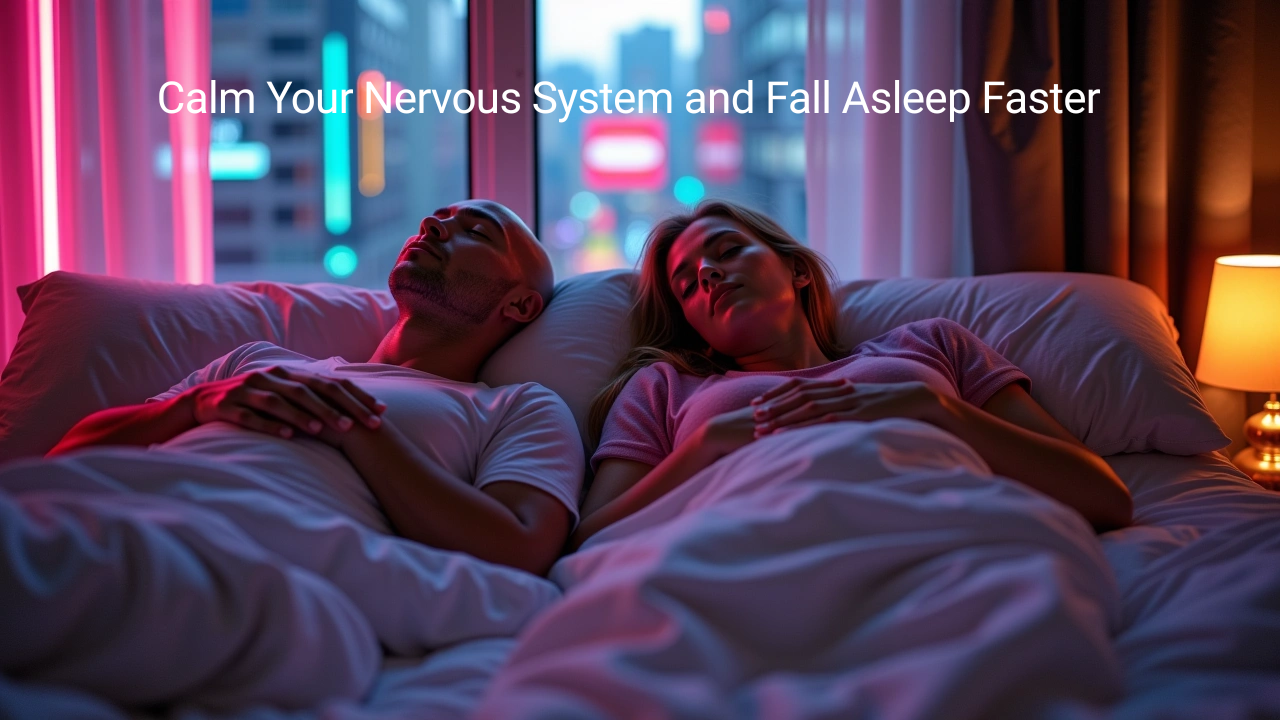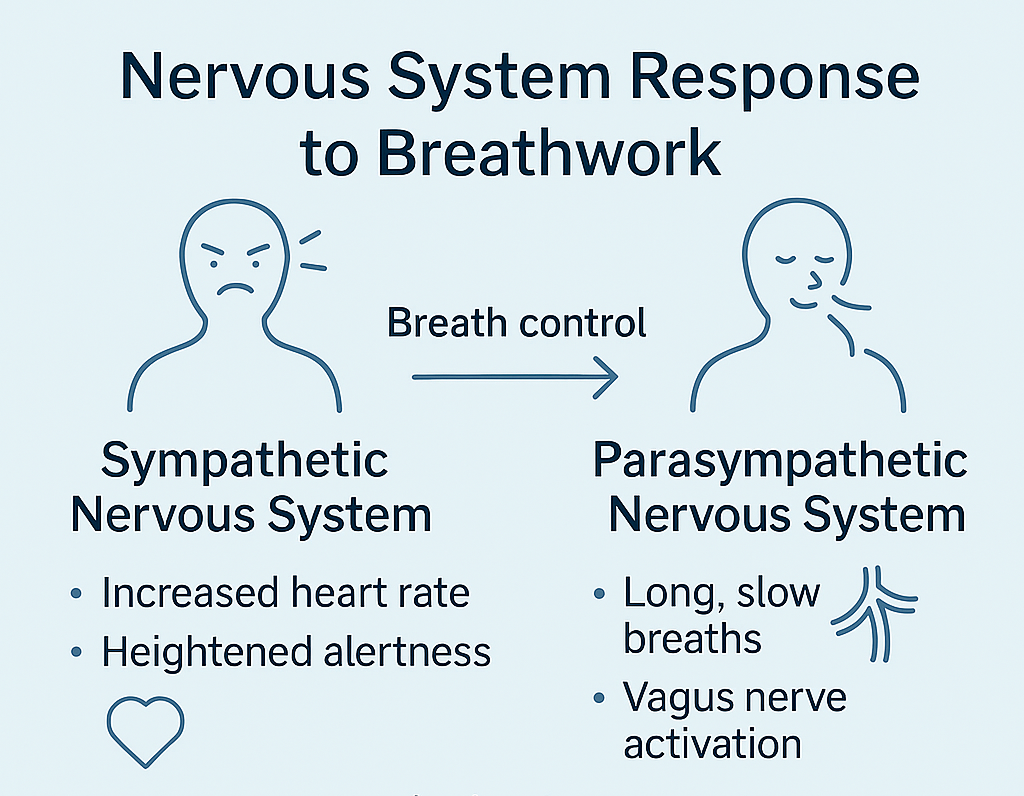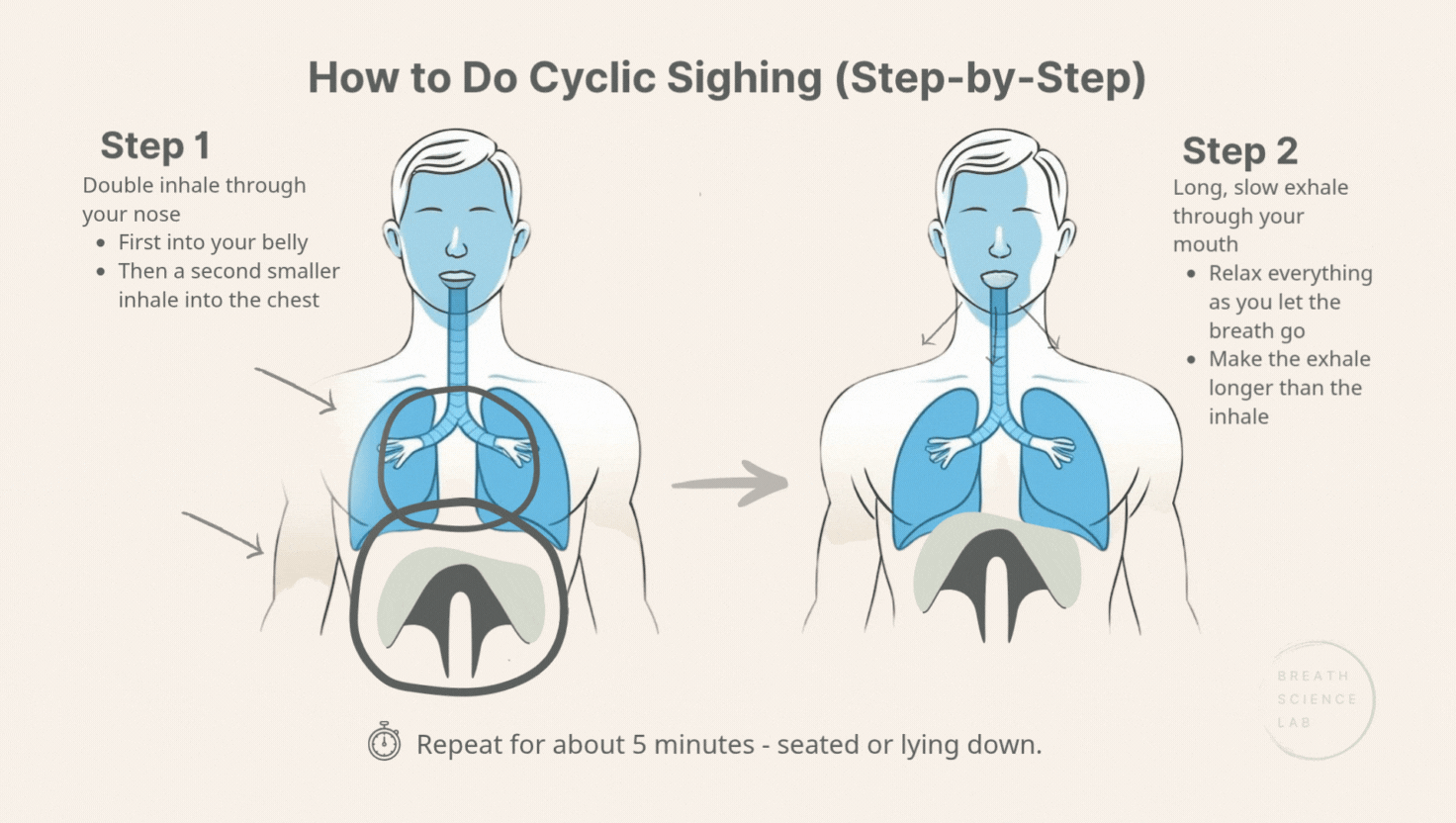Breathwork for Sleep: Science-Backed Strategies to Calm Your Nervous System and Fall Asleep Faster

For a lot of us, sleep problems aren’t just about bad habits or too much screen time. They’re about something deeper: a nervous system stuck in high alert.
If you’ve ever laid in bed with your heart racing, breath shallow, and mind buzzing - even though you’re completely exhausted - you know exactly what I mean.
For me, this shows up almost every night. After my wife and I put the kids to bed, there’s this frantic, end-of-day sprint: doing dishes, prepping school lunch for our daughter and tyding up the house. We always tell ourselves we’ll get eight hours of sleep… but with a 5:30 AM wake-up, that’s more wishful thinking than reality.
By the time we finally crawl into bed around 10 PM, I'm wired more than ever and stuck in work mode.
And that’s where breathwork comes in.
Sleep Isn’t a Decision - It’s a Nervous System Shift
One thing I’ve learned from research and lived experience:
You can’t think your way into sleep.
You don’t “decide” to fall asleep. Your body has to make a physiological shift from sympathetic (alert) mode to parasympathetic (rest) mode.
That shift is governed by your autonomic nervous system, which controls heart rate, breathing, digestion, and other behind-the-scenes functions that keep you alive.
Breathwork helps because it gives you a way to manually steer that shift.
When done right, certain breathing patterns act as a direct signal to your brain and body that it’s time to power down.

What Science Says About Breathwork and Sleep
Let’s get clear on what’s backed by research:
- Slow, controlled breathing reduces cortisol and heart rate.
Multiple studies confirm that slow, deep breathing lowers both stress hormones and heart rate. - Extending your exhale stimulates the vagus nerve, which calms the body.
This isn’t just theory - it's shown through measurable changes like increased heart rate variability (HRV), a marker of parasympathetic activation. - Breathing at 5-6 breaths per minute improves heart rate variability and reduces overall arousal.
This breathing rate has been linked to better autonomic balance and reduced stress.. - Cyclic sighing, done for 5 minutes a day has been shown to reduce stress and improve mood more effectively than mindfulness meditation.
The 2023 Stanford study (Balban et al.) showed that participants practicing cyclic sighing had better mood improvements and reduced respiratory rate compared to those doing mindfulness.
What I’m not claiming here: That breathwork boosts melatonin production. There’s no strong academic evidence for that connection yet.
What Actually Helped Me: From Overstimulated to Sleep-Ready
I’ve tested a bunch of breathing techniques and here is what I found:
4-7-8 breathing was one of the first I tried. It’s simple and portable: inhale for 4 seconds, hold for 7, exhale for 8.
Research shows it helps lower heart rate and blood pressure, and I’ve definitely felt some benefit from it.
But on nights when I’m especially wired, after the dishes, after the school lunch prep, after the long list of evening tasks - I needed something even more directly calming.
That’s when I started experimenting with cyclic sighing - just five minutes of it before bed.
The practice itself is simple: two soft inhales through the nose, followed by a long, slow exhale. The Stanford study behind it gave me extra confidence, but the real proof was how quickly it helped me downshift.
It’s not like I snap my fingers and fall asleep instantly. But I don’t lay there wired anymore.

What didn’t fit my nighttime routine:
There was a phase when I tried adding Wim Hof breathing at night. As much as I enjoy it for my morning routine (after cold showers or workouts), I didn't have enough time. I get the most out of Wim Hof breathing when I have the dedicated time to really focus on the the technique - it's perfect for a clear mind and an energy boost.
The Real Shift: Nervous System Training with Breathwork Over Time
Here’s the thing most people miss:
Breathwork for sleep doesn't work like magic. It’s about nervous system training.
Even five minutes a night, done consistently, starts to shift your baseline over time.
If you struggle with sleep because your body feels stuck in stress mode, breathwork offers a research-backed, side-effect-free way to help retrain that system.
Just start small. Stay consistent. Let your body relearn what calm feels like.
Want More Tools?
If this post hit home, here is a couple steps that can help:
👉 Download The Parasympathetic Reset Guide
👉 The 3-Minute Bedtime Protocol
Claims and Academic References:
- Nervous system stuck in high alert causes sleep issues
Reference: https://www.frontiersin.org/articles/10.3389/fpubh.2017.00155/full - Sleep is a physiological shift from sympathetic (alert) to parasympathetic (rest) mode, controlled by the autonomic nervous system
Reference: https://www.frontiersin.org/articles/10.3389/fpubh.2017.00155/full - Slow, controlled breathing reduces cortisol and heart rate
Reference: https://www.frontiersin.org/articles/10.3389/fphys.2023.1186546/full - Extending your exhale stimulates the vagus nerve, which calms the body
Reference: https://pmc.ncbi.nlm.nih.gov/articles/PMC9873947/ - Breathing at 5–6 breaths per minute improves heart rate variability and reduces overall arousal
Reference:https://pmc.ncbi.nlm.nih.gov/articles/PMC8924557/ - Cyclic sighing (5 minutes a day) reduces stress and improves mood more effectively than mindfulness meditation
Reference: https://pmc.ncbi.nlm.nih.gov/articles/PMC9873947/ - 4-7-8 breathing lowers heart rate and blood pressure
Reference: https://onlinelibrary.wiley.com/doi/10.14814/phy2.15389 - Consistent breathwork (even 5 minutes a night) trains the nervous system and shifts your baseline over time
Reference: https://pmc.ncbi.nlm.nih.gov/articles/PMC6406675/

